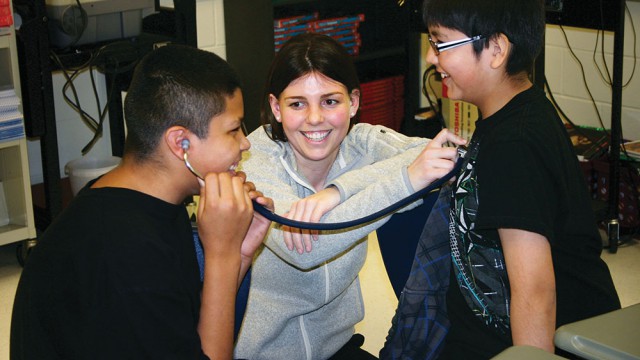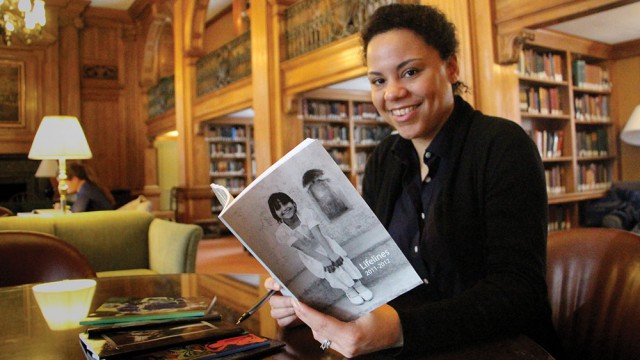Educating new generations of diverse health-care leaders who will help solve our most vexing challenges in health care. Meeting this mission of the Medical School takes more than providing an exceptional medical and graduate educational experience in classrooms, clinics, and labs.
It demands helping students flex their service-learning muscle, opening up opportunities for leadership in diverse learning environments, supporting their development in the art and compassion of medicine, and encouraging a healthy work-life balance.
For Meaghan Kennedy ('13), helping to create a new student experience within American Indian communities in Minnesota during her first year at Geisel kindled her passion for the difference health-care practitioners can make.
"I left Minnesota with a renewed sense of why I want to practice medicine," says Kennedy, who is now a first-year resident in family medicine at Concord (N.H.) Hospital. "I was so inspired by the individuals we met and the innovative clinical and public health programs they are implementing to improve the health and well-being of the Ojibwe people." Kennedy and the other medical students who took part in that maiden journey to Ojibwe reservations were transformed by it, according to this excerpt from their 2010 Indian Health Service Trip Report:

"All nine of us returned to Hanover as changed individuals, having learned and experienced so much over the course of our week on the reservations. As a group, we were inspired and motivated by the strength with which these communities work against the challenges of poverty, violence, and illness, all of which are deeply rooted in historical trauma. We were fortunate to work alongside the health-care providers and educators who serve these communities each day, and left armed with new skills and knowledge to apply in our futures as physicians."
Fourth-year Geisel student Jessica Fried embraces opportunities to grow as a leader and to help promote the healing arts. The current national chair of the AAMC's Organization of Student Representatives, she also helped revive the Geisel student-driven literary journal Lifelines, soliciting submissions and editing and publishing it in 2012 after a four-year hiatus.
"The past six years has been a tough time for the arts," says Fried. "With the economic strain felt by almost every sector, it has taken champions who prioritize and recognize the value of the arts to keep avenues of expression open. When I was editor-in-chief of Lifelines, I was able to understand how the creation and sharing of art can be a type of healing in and of itself.

"The pieces that find their home in Lifelines, created by medical students, patients, and their loved ones, are incredibly powerful," continues Fried. "Beyond showcasing the incredible talent of our community, Lifelines creates a space for the raw expression of human experience surrounding illness, love, loss, and life. Something beautiful happens when you give someone the opportunity to share a part of themselves through literature or art."
If it's September on Dartmouth's campus, you know the air will be turning crisp, the farmer's markets will buzz, and aspiring physicians will leave their stethoscopes on the sidelines to do battle and lay claim to the coveted Swenson Cup.
One of the best student stress-busting events of the fall, the Swenson Cup is named in honor of Rand Swenson, a Geisel professor of anatomy, former collegiate soccer player, and one of the biggest soccer fans in New England. The game is an annual clash between the first- and second-year medical student classes, and somehow the second-year MD class always seems to triumph over the team consisting of newly arrived first-year medical students.
Gordon "Dino" Koff, this year's head referee (who also doubles as associate dean for admissions and student services), credited the second-years' "coordinated uniforms and sold-out cheering section" as reason for the 2013 2-0 victory. Or it may have been medical student/coach Kristen Jogerst, who earned praise from Koff: "Her patience, subbing pattern and demeanor—even when stressed—were remarkable!"
An annual journey to understand American Indian health. A literary journal that elevates the voices of patients, their families, and healers. A fall soccer classic that produces bragging rights and, more importantly, fellowship. What is the common element that ties all of these enriching student experiences together and makes them happen?
The Fund for the Geisel School of Medicine at Dartmouth.
Gifts to the Geisel Fund provide critical unrestricted support of student scholarships and experiences, curriculum development, innovative programs, state-of-the-art facilities, the recruitment and retention of high-caliber faculty, and the overall operation of the Medical School. The Fund helped ensure that Meaghan Kennedy—and other students every year—could travel to Minnesota and be changed by the experience. It supports the development and printing of Lifelines.
And yes, it also ensures that the second-year students look smashing in coordinated Geisel green, so they can capture the Swenson Cup yet again.